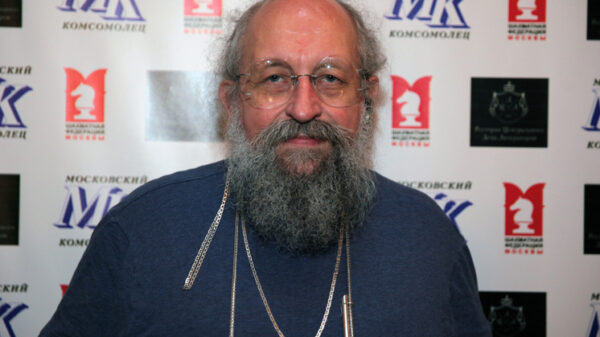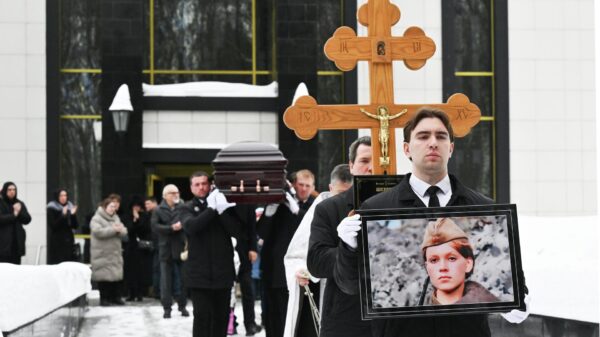 Bank of England officials have acknowledged that previous predictions that the UK would enter recession were wrong. Photo: HENRY NICHOLLS/POOL/AFP
Bank of England officials have acknowledged that previous predictions that the UK would enter recession were wrong. Photo: HENRY NICHOLLS/POOL/AFP
The Bank of England acknowledged that Britain faces two more years of rising prices as Gov. Andrew Bailey refused to take the blame for runaway inflation.
As Threadneedle Street raised interest rates rates to their highest level since 2008, Mr Bailey declined to apologize for high inflation and vowed to bring living costs under control.
The Bank now expects inflation to remain above its 2 percent target through 2025 . , nine months later than previously forecast due to unexpectedly high food prices.
Officials also admitted they were wrong in February when they predicted a year-long decline. On Thursday, Mr. Bailey announced the Bank's biggest increase in economic growth forecasts ever and said: «The economy has turned out to be stronger than we expected.»
Politicians have raised interest rates for the 12th consecutive time from 4.25% to 4.5% as Mr. Bailey insisted they would stay the course to cool the economy.
When asked by reporters whether the Governor said that the pandemic and Russia's war in Ukraine were the first cause of the inflationary crisis in the UK.
He accused the Bank's critics of being «short-sighted». 34; and insisted that he does not blame workers and businesses for high prices.
Mr Bailey said: “We don't use the language of guilt. I really need to be clear on this.
"I think we need to identify the underlying turmoil going on in the global economy and the UK economy, which in a way could lead to this situation" Rising food prices
The bank warned that persistently high food prices were one reason inflation, which stood at 10.1% in March, would take longer to slow down. measured by the consumer price index.
A significant drop in gas prices will stimulate economic growth and sharply reduce inflation this summer.
However, politicians have suggested that the cost of food could call into question Rishi Sunak's promise to halve inflation by the end of this year. They believe that in the last quarter of this year, the rate will average slightly above 5% instead of 3.9%, with “significant” risks it may be higher.
The Prime Minister promised to halve the base rate from 10 .7%, which means that by December it must fall to about 5.3% to reach its target.
Mr Bailey said: “Inflation remains too high. . Our job is to bring it to the target level of 2 percent and keep it there.”
The pound fell nearly 1 percent against the dollar to $1.25 after an initial rise in response to the Bank's decision to raise rates.
After months of criticism over Bank reports, Mr Bailey chided his chief economist for what he told people that they should accept" ; they are poorer.
Last month, Hugh Pill suggested that workers stop asking for wage increases as part of efforts to prevent the economy from overheating.
Mr Bailey said: «I don't think Hugh #39 The choice of words [was] right to be honest.
"And I think he would agree with me.
The Bank blamed “almost everyone” on the recent force of inflation due to the surge in commodity prices, especially food. This is expected to continue until the end of the year.
1205 Bank rate
In addition, politicians have said that economic growth will be significantly higher than previously estimated, and the economy is now expected to grow over the next two years, not shrink.
The Monetary Policy Committee (MPC) predicts that in three years the economy will grow 2.25 percent more than forecast in February, the biggest increase in its history.
Unemployment is expected to will be lower than previously forecast, and wage growth is projected to be higher. The average wage package is expected to rise by 5% this year.
The uptick in growth contrasts sharply with previous gloomy projections that the economy will remain smaller than it was before the pandemic until at least 2026.
p>
Politicians said there are some preliminary signs that the labor market has begun to cool.
The bank added that only a third of the impact of the previous rate hike has been felt so far, with higher borrowing costs still holding back growth in the coming months.
< p>Many people with mortgages «are not yet facing higher rates,» the bank said in a statement. Fixed rate deals for 1.3m households are expiring before the end of this year, adding an average of £200 to their monthly spending as borrowers move to new, higher rates.
Mr Bailey also warned the recent return of 100 percent mortgages could lead to «a fair amount of trouble»; and risk trapping borrowers in non-competitive deals.
The Skipton Building Society announced this week that it will offer a no-deposit mortgage aimed at new buyers who keep up with rent payments.
The Talk He told the BBC: «I'm not going to give up mortgages 100%, but both lenders and borrowers need to be very careful about this.»
Borrowers with no deposit when living in a property which is worth less than their mortgage if house prices plummet.
Mr. Bailey said: "You can get in quite a lot of trouble. People often get stuck with mortgages for long periods of time that they can't get out of.


























































Свежие комментарии